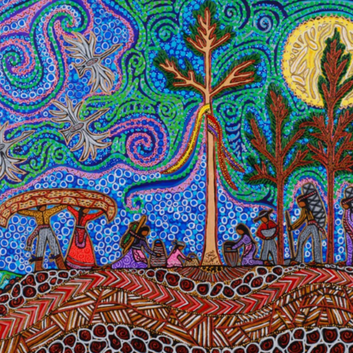Acknowledgement
 Artist: Leah Dorion
Artist: Leah Dorionhttps://newjourneys.ca/en/articles/celebrating-a-deep-cultural-connection-to-the-land
What is an acknowledgement?
The verb ‘to acknowledge’, meaning to admit or to show one’s knowledge, appears in English in the late 1400s. At that time, acknowledge was a blend of two Middle English words—aknow (to admit, to show one’s knowledge) and cnawan (to recognize).
The word acknowledge is from Old English oncnawan (to understand, to come to recognize), from Proto-Germanic knew, and from the Proto-Indo-European (PIE) root gno (to know).
The noun acknowledgement, meaning the act of acknowledging, appears in English in the 1590s. By the 1610s, an acknowledgement was a “token of due recognition” (Online Etymological Dictionary).
In the Acknowledgements section of a book, the author recognizes the support and contributions made by certain individuals and groups to the work.
Since the late 1990s, the term ‘ACK’ (an abbreviation of acknowledgement) appears in digital communication protocols. ACK is a signal sent by a device to indicate that data has been successfully received.
What are Indigenous land or territorial acknowledgements? “Land acknowledgements, also known as territorial acknowledgements, are short statements that recognize both the land and the Indigenous people who lived — and in many situations continue to live — on the land prior to Canada’s colonial history” (The Canadian Encyclopedia). In Canada, such acknowledgements became common following the publication of the 2015 Truth and Reconciliation Report.
A land or territorial acknowledgement at the beginning of a public gathering is a statement or admission of ‘what is’. Such an acknowledgement is a token of due recognition or recognition which is due (or perhaps overdue).1 The unsaid response to a land acknowledgement is “Yes, I got the message” or simply “Message received”.
And, of course, a land or territorial acknowledgement is but one of many actions that follow from the Truth and Reconciliation Report.
1 Land acknowledgements are often offered in a prescribed format or manner. The speaker need not add any personal commentary. In this sense, the acknowledgement is a type of ritual—it is always the same. Interestingly, the word ritual and the word arithmetic have the same origins—just as a ritual is always the same so also does 2+2 always equal 4.
References:
Online Etymological Dictionary, https://www.etymonline.com/
https://www.thecanadianencyclopedia.ca/en/article/land-acknowledgment
https://www.quora.com/Is-ac-a-prefix-in-the-word-acknowledge
https://en.wikipedia.org/wiki/Land_acknowledgement
Chrona, J. (2022). Wayi wah! Indigenous pedagogies: An Act for Reconciliation and Anti-Racist Education. Winnipeg, MB: Portage and Main Press.
Published on August 16, 2023 10:36
No comments have been added yet.



